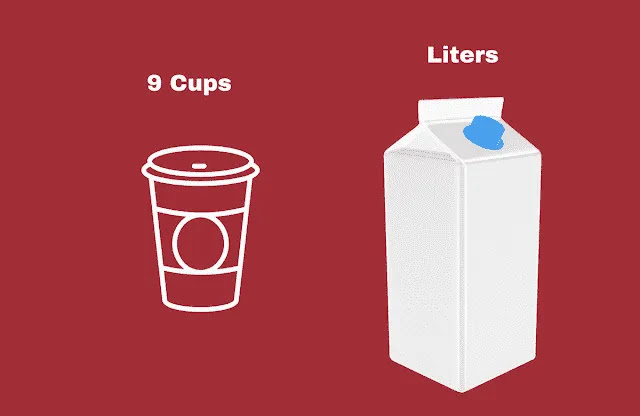9 Cups to Liters
In the culinary world, exact estimations are the key to accomplishing reliably heavenly outcomes.
Nonetheless, recipes frequently utilize various units of estimation, which can be mistaken for home cooks.
In this article, we'll give you extensive aid on the most proficient method to convert 9 cups over completely to liters precisely.
By dominating this transformation, you'll have the option to with certainty adjust recipes, guaranteeing that your culinary manifestations turn out entirely like clockwork.
Understanding the Basics:
Before we dig into the change cycle, we should lay out a basic comprehension of the units in question: cups and liters.
Cups:
Cups are a usually utilized unit of estimation, especially in North America. They are ordinarily utilized for estimating dry fixings like flour, sugar, and grains.
One cup is equivalent to roughly 236.59 milliliters or 0.24 liters.
Liters:
Liters are important for the decimal measuring standard and are generally utilized around the world.
They are primarily used for measuring liquids and larger quantities of ingredients. One liter is equivalent to 1000 milliliters or 4.23 cups.
Converting 9 Cups to Liters:
To convert 9 cups to liters accurately, follow this simple formula:
Liters = Cups × 0.24
Applying this formula to our specific case:
Liters = 9 cups × 0.24
Liters = 2.16 liters
So, 9 cups is equal to 2.16 liters.
Why Accurate Measurements Matter:
Accurate measurements play a vital role in achieving exceptional culinary results. Here's why they matter:
Consistency:
Exact estimations guarantee predictable outcomes, permitting you to reproduce your #1 dishes with a similar degree of scrumptiousness like clockwork.
Balancing Flavors:
Recipes often rely on the right balance of ingredients. Accurate measurements help you maintain that balance, ensuring the flavors harmonize perfectly.
Texture and Baking:
In baking, precise measurements are crucial to achieve the desired texture and rise in cakes, cookies, and bread. Accuracy ensures your baked goods turn out light, fluffy, and moist.
Adapting Recipes:
Accurate measurements are especially important when adapting recipes. By converting units correctly, you can confidently modify ingredient quantities without compromising the overall outcome.
Tips for Accurate Cooking Measurements:
To enhance your cooking experience, consider the following tips:
Invest in quality measuring tools:
High-quality measuring cups, spoons, and a kitchen scale can provide more accurate measurements, improving the overall outcome of your dishes.
Understand ingredient density:
Different ingredients have varying densities, meaning that the same volume can have different weights. Pay attention to ingredient density to ensure precise measurements.
Keep a conversion chart:
Create or download a conversion chart that includes common measurements such as cups, liters, ounces, and grams. This reference will be invaluable when adapting recipes from different sources.
Practice and refine:
Like any skill, accurate measuring takes practice. Experiment, make adjustments, and take note of your modifications to fine-tune your cooking techniques over time.
Conclusion:
Accurate measurements are fundamental to achieving delicious results in the kitchen.
By mastering the conversion of 9 cups to liters, you can confidently adapt recipes, ensuring that your culinary creations consistently delight your taste buds.
Remember to use quality measuring tools, understand ingredient density, keep a conversion chart handy, and practice to refine your skills.
With accurate measurements as your ally, you're on your way to culinary success. Start converting 9 cups to liters today and unlock a world of precise and delicious cooking possibilities.



.png)

.png)

.jpg)
.png)
.png)


0 Comments